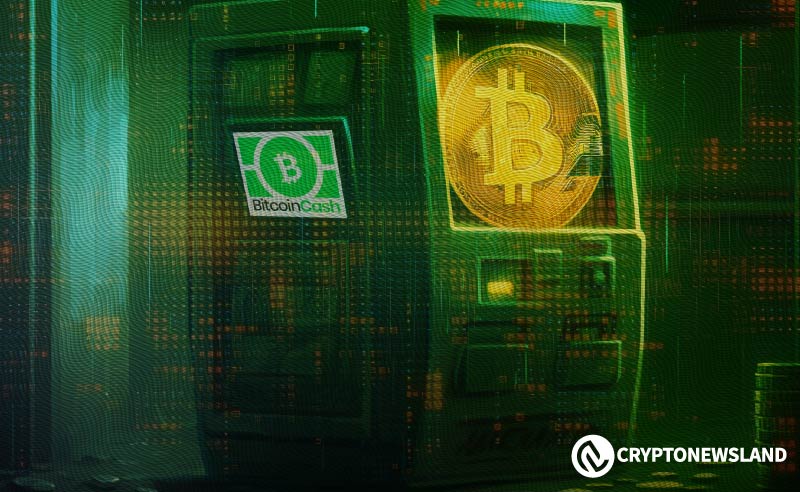The blockchain sector is highly competitive, with various projects constantly striving to enhance scalability, accelerate transaction speeds, and improve decentralization. In our comparative study, we delve into Bitcoin Cash (BCH) and BlockDAG (BDAG)—two blockchain initiatives each marked by distinct technological strategies.
We will compare how each measures up in areas like scalability, transaction fees, decentralization, and community adoption.
Bitcoin Cash: Enhancing Financial Transactions Through Expanded Block Sizes
Bitcoin Cash (BCH) emerged in 2017 from a hard fork of Bitcoin, initiated to provide quicker and more economical transaction processing. By extending the block size from 1 MB to 32 MB, BCH enhances its capacity to handle numerous transactions per block, thereby reducing network congestion and diminishing transaction fees.
Distinctive Features of Bitcoin Cash:
- Consensus Protocol: Implements a Proof of Work (PoW) mechanism akin to Bitcoin but adapted to accommodate larger blocks.
- Transaction Performance: Processes about 100 transactions per second (TPS) with transaction fees generally below $0.01.
- Decentralization Efforts: Strives to preserve decentralized mining operations while improving transaction throughput.
- Primary Applications: Well-suited for peer-to-peer payments, international remittances, and e-commerce transactions.
The increased block size in Bitcoin Cash facilitates efficient and low-cost transactions. However, there are concerns that this adjustment might centralize the network, as larger blocks demand more storage and bandwidth, potentially sidelining smaller miners and consolidators.
BlockDAG: Transforming Scalability with Directed Acyclic Graph Technology
BlockDAG (BDAG) is an emerging contender in the blockchain arena, utilizing a Directed Acyclic Graph (DAG) structure instead of the conventional linear blockchain. This advanced architecture facilitates the parallel processing of multiple blocks, significantly enhancing transaction throughput without the common slowdowns experienced by traditional blockchains.
Core Features of BlockDAG:
- Consensus Approach: Integrates a modified Proof of Work (PoW) with DAG technology, enabling limitless scalability.
- Transaction Capacity: Offers potentially unlimited transactions per second (TPS) thanks to parallel processing.
- Cost Efficiency: Maintains exceptionally low transaction fees, unaffected by changes in network traffic.
- Fundraising Achievement: Successfully raised over $116 million, with more than 15 billion BDAG coins sold during its presale.
- Community Involvement: Supports over 200,000 active users with the X1 Miner App, and plans further expansion after the mainnet launch.
The innovative application of DAG technology in BlockDAG makes it highly suitable for scenarios demanding large-scale transaction processing, such as in IoT deployments, supply chain operations, and financial services. Although still in the presale phase, BlockDAG’s swift development and robust community support herald a bright and promising future.
Bitcoin Cash vs. BlockDAG: A Side-by-Side Evaluation
| Feature | Bitcoin Cash (BCH) | BlockDAG Network (BDAG) |
| Consensus Mechanism | Proof of Work | DAG with Modified Proof of Work |
| Transactions per Second | ~100 TPS | Scalable |
| Average Transaction Fee | <$0.01 | Extremely low |
| Smart Contracts | Limited Support | Full Support |
| Full Support | Payments, Remittances | IoT, Supply Chain, Finance |
| Decentralization | Moderate | High |
| Network Stability | Occasional congestion | Resilient and fault-tolerant |
| Market Capitalization | ~$7.49 billion (as of 2024) | N/A (Presale Phase) |
Scalability Challenge
In the blockchain realm, scalability is a paramount concern. Bitcoin Cash addresses this by enlarging its block sizes to accommodate more transactions within each block. While this method is effective, it risks centralizing the network, as only more robust nodes are capable of managing the larger data loads.
Conversely, BlockDAG utilizes parallel block processing to achieve unmatched scalability, enhancing its efficiency for sectors that handle vast transaction volumes. This adaptability allows BlockDAG to scale smoothly with growing demands, positioning it as a potential leader in areas such as IoT and real-time financial services.
Outcome: BlockDAG edges ahead with its pioneering strategy for boundless scalability.
Transaction Fees: Prioritizing Affordability
Both platforms are committed to keeping transaction fees low, a crucial factor for broad user adoption.
Bitcoin Cash: Consistently maintains fees under $0.01, making it well-suited for frequent, everyday transactions.
BlockDAG: Built to keep fees exceptionally low, even as the network expands, thanks to its efficient consensus model.
Result: It’s a close call, but BlockDAG’s fee structure could offer a slight edge as its network scales.
Decentralization & Security: Striking a Balance
While speed and scalability are essential, security and decentralization are equally important.
Bitcoin Cash: Uses a proven Proof of Work (PoW) model for security; however, its larger block sizes can lead to centralization in mining, potentially increasing vulnerability to attacks.
BlockDAG: Employs a DAG structure to boost decentralization without compromising security. Its design enhances resilience to congestion and ensures fault tolerance, supporting continuous network performance.
Verdict: BlockDAG takes the lead with its decentralized and fault-tolerant architecture.
Community & Ecosystem: Shaping Tomorrow
Bitcoin Cash: Boasts a well-established ecosystem, with broad support from major exchanges, wallets, and merchants.
BlockDAG: Experiencing swift growth, with over 170,000 coin holders and vibrant community engagement during its presale. Developer resources and a mining app continue to draw new participants.
Outcome: Bitcoin Cash holds the advantage in current adoption, yet BlockDAG’s rapid expansion signals promising potential for the future.
The Ultimate Choice: Bitcoin Cash or BlockDAG?
Which blockchain is best positioned for the future?
For those seeking a reliable, efficient platform with low transaction fees, Bitcoin Cash is a solid option. Its established network and active community make it a dependable choice for daily transactions.
On the other hand, for those interested in a forward-thinking technology with boundless scalability, BlockDAG presents an exciting alternative. With its innovative architecture and strong presale success, BlockDAG has the potential to thrive in industries requiring high transaction volumes.
Website: https://blockdag.network
Presale: https://purchase.blockdag.network
Telegram: https://t.me/blockDAGnetworkOfficial
Discord: https://discord.gg/Q7BxghMVyu


